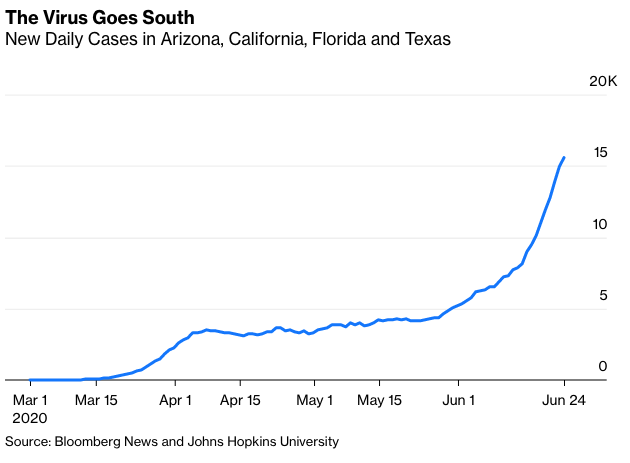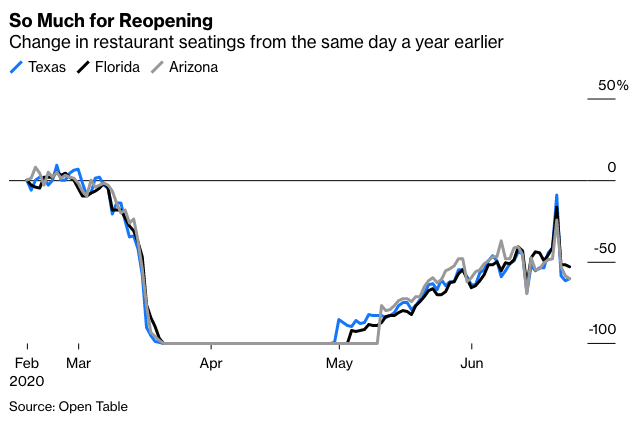Coronavirus is exploding in big southern states such as Texas, Florida and Arizona. This entirely preventable disaster will have devastating consequences for these states’ economies.
The outbreaks that slammed the Northeast and much of the Midwest in the spring are now mostly under control. But in much of the South and the West, the virus is now on the rampage. Hopes that the summer sun would suppress the disease have been dashed—in fact, by driving people inside to mingle in air-conditioned spaces, the heat may be facilitating the spread.

This was a human blunder. Leaders such as Texas governor Greg Abbott and Florida governor Ron DeSantis started reopening their state’s economies in early May, long before the threat of the virus had passed. And many voters scoffed at the threat of the virus; some even loudly disdained the practice of mask-wearing.
Fortunately, death rates are not yet as high as they were during the epidemic’s Northeastern wave—possibly because society is doing a better job of isolating the old and vulnerable, possibly because treatments like dexamethasone are saving the lives of the critically ill. But even those who survive the virus often suffer severe long-term health problems.
In any case, the economies of states like Florida and Texas are going to take a big hit. Research shows that fear of coronavirus, rather than lockdown policies, is responsible for the vast majority of the economic impact of an outbreak. This will be true of the new wave as well. Already, restaurant reservations—an early bellwether of virus avoidance behavior—are falling in the new epicenters:

The obvious losses will accrue to local service businesses—restaurants, bars, brick-and-mortar stores. But the hit to tourism could be even more damaging. The industry is Florida’s largest, accounting for an estimated 11% of the state’s gross domestic product. Although less famous for beaches and amusement parks, Texas took in $164 billion from tourism in 2018 (more in dollar terms than Florida’s $112 billion). Arizona and Southern California also depend a lot on the sector. All these places will suffer, as their names become more associated with uncontrolled disease than with sunshine and fun.
Health care is another vulnerable Sun Belt industry. Hospitals and medical offices are some of the most obvious places to catch coronavirus, so people suffering non-life-threatening problems or needing routine care will tend to stay away. The sector generates about $150 billion a year in Texas and $132 billion in Florida, and has recently been the single biggest driver of job growth in Arizona.
These tentpole industries are important because they bring in outside dollars. Reduced tourism echoes through a state’s economy, as fewer tourist dollars mean less spending by locals. Less health-care spending hurts cities, as fewer people drive in from surrounding towns to see the doctor. Reductions in tax revenue hurt education, infrastructure, transportation, and everything else state and local governments spend money on.








